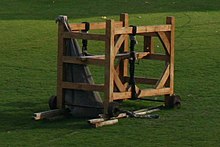springald
Appearance
English
[edit]Pronunciation
[edit]- IPA(key): /ˈspɹɪŋəld/
Audio (Southern England): (file)
Etymology 1
[edit]Apparently from spring, with an uncertain final element.
Noun
[edit]springald (plural springalds)
- (archaic) A young man, a stripling, a youth.
- 1596, Edmund Spenser, “Book V, Canto X”, in The Faerie Queene. […], London: […] [John Wolfe] for William Ponsonbie, →OCLC:
- There came two Springals of full tender yeares, / Farre thence from forrein land where they did dwell […]
- 1607 (first performance), [Francis Beaumont], The Knight of the Burning Pestle, London: […] [Nicholas Okes] for Walter Burre, […], published 1613, →OCLC, Act II, signatures E, recto – E2, verso:
- Sure the diuell, God blesse us, is in this Springald, why George, dist ever see such a fire-drake, I am afraid my boie's miscaried, if he be, though hee were Maister Mery-thoughts sonne a thousand times, if there bee any Law in England I'le make some of them smart for't.
- 1648, Robert Herrick, “How the Wall-flower Came First, and Why So Called”, in Hesperides: Or, The Works both Humane & Divine […], London: […] John Williams, and Francis Eglesfield, and are to be sold by Tho[mas] Hunt, […], →OCLC, page 12:
- Understand, this Firſt-ling [the wallflower] vvas / Once a briſk and bonny Laſſe, / VVho a ſprightly Springall lov'd, / And to have it fully prov'd, / Up ſhe got upon a vvall, / Tempting dovvn to ſlide vvithall: / But the ſilken tvviſt unty'd, / So ſhe fell; and bruis'd, ſhe dy'd.
- 1819 December 20 (indicated as 1820), Walter Scott, Ivanhoe; a Romance. […], volume (please specify |volume=I to III), Edinburgh: […] Archibald Constable and Co.; London: Hurst, Robinson, and Co. […], →OCLC:
- this same springald, who conceals his name, and despises our proffered hospitality, hath already gained one prize, and may now afford to let others have their turn.
Alternative forms
[edit]Etymology 2
[edit]
From Old French espringale; of Germanic origin, akin to English spring.
Noun
[edit]springald (plural springalds)
- (historical) An ancient military engine for launching stones and arrows by means of a spring.
- 2007, Kelly DeVries, Robert Douglas Smith, Medieval Weapons: An Illustrated History of Their Impact, ABC-CLIO, →ISBN, page 138:
- The springald is a somewhat more problematic weapon as it is completely unclear whether it was the same weapon as the Roman ballista which some historians believe never disappeared from the battlefield and remained in use throughout […]
- 2010, Matt Landrus, Leonardo da Vinci’s Giant Crossbow, Springer Science & Business Media, →ISBN, page 54:
- Although generally more powerful than the great crossbow, the springald was not as versatile, since it could not be moved quickly during a siege, nor would it operate properly in wet conditions at sea.
Alternative forms
[edit]Translations
[edit]ancient military engine
|
Further reading
[edit]Anagrams
[edit]Categories:
- English 2-syllable words
- English terms with IPA pronunciation
- English terms with audio pronunciation
- English lemmas
- English nouns
- English countable nouns
- English terms with archaic senses
- English terms with quotations
- English terms derived from Old French
- English terms derived from Germanic languages
- English terms with historical senses

